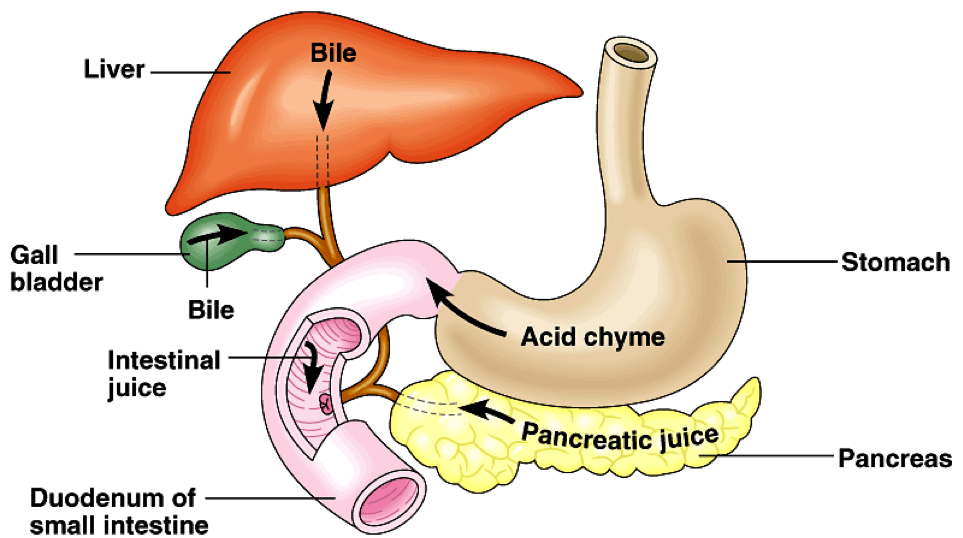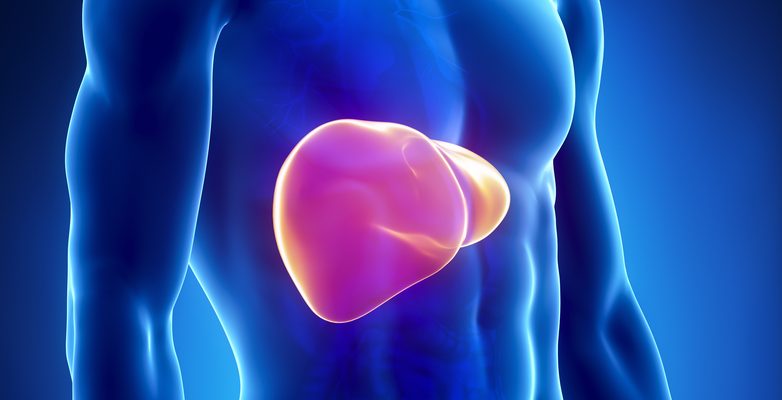Describe the Role of the Liver in Digestion
The digestive role of the liver is to produce bile and export it to the duodenum. State the role of various organs of the digestive system in the enzymatic mechanical and chemical digestion of foods.

What Role Does The Liver Play In Digestion Socratic
The liver is the largest solid organ inside the body and plays a very important role in the process of digestion by physically regulating it and ensuring release of post digestive nutrients into the system.

. The liver and digestion The liver does not secrete any enzymes but it plays an important role in digestion and then processing food molecules that have been absorbed. The liver is one of the main areas in which toxins and other things are broken down a process called metabolism. The gallbladder is a small sac that sits under the liver and is connected to the intestines When we eat food bile is transported from the gallbladder into the intestines to help with the breakdown of fats in the body.
The production of bile makes the liver an important organ within digestion as it emulsifies fat much like dish soap acts on fat and grease to split it into smaller pieces. The digestive role of the liver is to produce bile and export it to the duodenum. This process makes it much easier for the body to process fats.
Describe the route of bile from the liver to the gallbladder. Its stored until the body needs it for digestion of fats. Learn vocabulary terms and more with flashcards games and other study tools.
Bile is stored inside the gall bladder where it is concentrated and then released when needed to. Functions of the Liver. The liver helps your body get rid of bilirubin.
Some things that the digestive system absorbs can build up in the blood and poison the tissues of the digestive tract or other organs. Start studying Roles of liver gallbladder and pancreas in digestion. They empty into the upper part of your small intestine called the duodenum.
Which of the statements describe the role of the liver in digestion. The liver consists of four lobes which are each made up of eight sections and thousands of lobules or small lobes. Describe how the processes of breathing circulation and exercise are interrelated.
The liver helps maintain proper digestion by secreting bile so that food can be broken down and made into small molecules that can be absorbed monitoring blood sugar levels so that energy is available to break down food and helping the pancreas produce certain digestive enzymes. The liver plays a role in digestion by secreting bile. These juices travel through your pancreas via ducts.
The liver is the largest gland in the body and therefore has many important roles that are not related to digestion including the creation of proteins and blood clotting factors. The livers primary role in digestion is the processing of nutrients that are absorbed by the small intestine. Biology questions and answers.
The secretion of bile and bile salts. Your liver continually produces bile. The GI tract is a series of hollow organs joined in a long twisting tube from the mouth to the anus.
The pancreas produces pancreatic juice which contains digestive enzymes and bicarbonate ions and delivers it to the duodenum. Describe the functions of the liver that are related to digestion. Role of liver in digestion of fats.
This enzyme works together with bile which your liver produces to break down fat in your diet. The digestive system is made up of the gastrointestinal tractalso called the GI tract or digestive tractand the liver pancreas and gallbladder. Each day your pancreas makes about 8 ounces of digestive juice filled with enzymes.
The liver is on the right side of the body just under the rib cage When the liver is diseased the body cannot filter out toxic substances as efficiently. Role of Liver in the Digestion. This juice is stored in Gall bladder.
The liver is an essential organ of. Liver Function In Digestive System. Among its most important jobs are.
Liver secrets bole juice which helps in the digestion of lipids in intestine. Bile is a fluid produced in the liver and stored in the gallbladder. The gallbladder primarily stores concentrates and releases bile.
These are the different enzymes. Hepatocytes within the liver also absorb much of the glucose that comes from digested food and stores the sugar as glycogen. This is a chemical that helps turn fats into.
The gallbladder primarily stores concentrates and releases bile. Part of that role is the creation of bile - which is the chemical that breaks down fats and allows the nutrients within fat such as fat soluble vitamins like A D E and K. The Digestive System - The Accessory Digestive Organs 28 Terms.
The liver produces bile. The liver also produces bile a fluid that helps digest fats and carry away waste. The liver also can play a role in the digestive system by the way that it filters out toxins.
A produces digestive enzymes that aid protein digestion B produces bile which aids lipid digestion C produces gastric juice which aids digestion in the stomach D produces insulin which promotes lipid storage. This happens from the breakdown of your red blood. In addition to pancreatic and intestinal secretions a third secretion that is poured into the duodenum is.
The liver is the bodys natural detoxifier as it cleanses the body of toxins and produces bile to support healthy digestion. The pancreas produces pancreatic juice which contains digestive enzymes and bicarbonate ions and delivers it to the duodenum. The main functions of the liver as an accessory digestive organ within the human digestive system are.

Understanding The Liver S Role In Digestion

How Does The Liver Function In Related To The Digestive System Socratic

Comments
Post a Comment